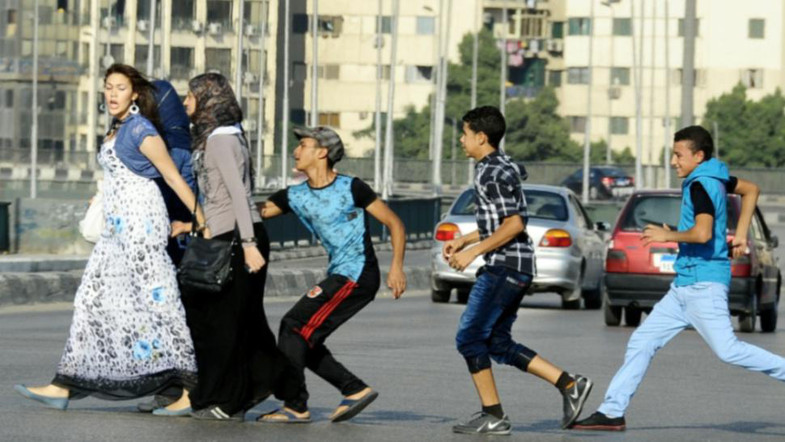Not only has sexual harassment been one of Egypt’s most common and acute societal problems in recent years, but also it has become one of the most actively-discussed topics, including the motives of the harasser.
In a recent survey conducted by UN women and Promundo, a Brazilian organization campaigning for gender equality, it was revealed that about 43 percent of men in Egypt believe that women like the attention and they admire being sexually harassed. Moreover, 71 percent of Moroccan men agree with this theory.
Previous reports by national and international organizations suggested that more than 99 percent of Egyptian women have been subject to sexual harassment.
Although victim-blaming is a typical reaction to sexual harassment incidents in Egypt, it was peculiar when men voiced their take on the subject and clearly mentioned that women are excited by harassment. Their views can also be translated into “women like being physically violated, chased in the dark on their way home, hiding behind cars in the streets to escape their harassers, or women would rather live off fear and doubt instead of actual jobs”.
Alia Soliman, the Communications Manager at HarrasMap, spoke to Egyptian Streets about the study and the sexual harassment phenomenon in Egypt in general that keeps on exacerbating over the years.
Soliman says that prior to 2010, media referred to sexual harassment as “catcalling”. It sort of depicted the issue as something simple and common.
“There is a wide social acceptance of the issue, it is often met with negativity because people see it a lot. They forget, however, that it is a crime punishable by law,” says Soliman
“Hence, people may try to justify the actions they usually see on the streets. They start to blame girls and cite tight clothes as the reason, or even say that girls who eat in public want to be harassed,” adds Soliman.
Soliman believes that people have been blaming girls for too long; as a result, they turned passive when witnessing harassment cases that happen in front of them. Soliman adds that men believe, to an extent, that women and girls are happy and content when they are subject to sexual harassment.
“Besides the blaming, they start to create excuses for harassers, including poverty and not being able to get married, and because they have sexual needs,” says Soliman.
“But if this is true, why do managers sexually harass their employees, why do married people harass?” Soliman wonders.
Soliman firmly supports the right of women and girls to know the different types of harassment they are subject to and the legal actions they can take against their harassers.
Sexual harassment is not only limited to touching, but verbal harassment, electronic and several other violations are classified as harassment and punishable by the terms of the law as well.
However, Soliman concludes by saying that now women and girls are more bold and courageous to talk about their encounters with harassment. They may even speak up on social media even though they know they may be criticized.
According to the report that interviewed about 10,000 people from the Middle East, both men and women, 64 percent of Egyptian men admitted that they harassed women. Furthermore, the vast majority of the surveyed blame women for sexual harassment.
The report is the first time that Promundo touches upon the sexual harassment topic from a male point of view.






Comments (9)
[…] https://egyptianstreets.com/2017/07/02/43-percent-of-egyptian-men-still-believe-that-women-like-sexu… […]
[…] ‘Modernist Women of Egypt’: A Celebration of Nationalism, Womanhood, Activism and Beyond 43 Percent of Egyptian Men Still Believe that Women Like Being Sexually Harassed: Report […]